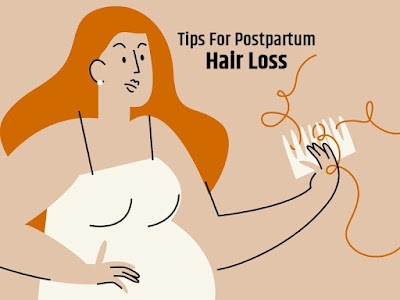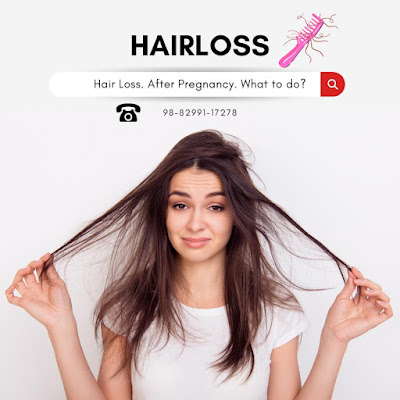How to control postpartum hair fall
Taking the Crown: Dealing with Hair Loss After Childbirth:
Natural changes in hormones during pregnancy can lead to hair fall after delivery, which can cause anxiety and stress in new mothers. Although complete prevention is unattainable, there are some tips that can help control hair loss and promote stronger regrowth.
Postpartum Hair Loss: What is it?
Excessive hair loss that occurs a few months after giving birth is known as postpartum hair loss. Hormonal changes occurring during and after pregnancy are the reason for this.
How does hair grow?
Follicles, which are tiny pores in the skin of your scalp, are where hair grows. Your hair constantly grows and falls. There are three stages of this hair growth cycle that you will experience again during your lifetime:
1. The phase of active hair growth is called the anagen phase. This may continue for two to six years. At any given time, 85% to 90% of your hair is in this stage.
2. Hair follicles shrink during the brief catagen phase, which is a transitional phase.
3. The three months or so that make up the telogen phase is a resting phase. next,
Another name for postpartum hair loss is telogen effluvium.
How does hair fall after giving birth?
Pregnancy hormones cause many hairs in the growing phase (anagen) to suddenly change to the resting phase (telogen). After a few months, your hair falls out.
On average, your scalp contains 80,000-120,000 hairs, and you can lose up to 100 of them every day. If you have postpartum hair loss, you may lose more than 100 hairs per day.
What is the duration of postpartum hair loss?
Postpartum hair loss is temporary, despite the fact that it can be bothersome. Less than six months should pass during shedding. When your baby turns one year old, your hair should return to its natural fullness.
Symptoms and causes of postpartum hair loss
What are the symptoms of postpartum hair loss?
The main indicator is to see more loose hair than usual on your brush, pillow, or shower floor. Additionally, you may notice more hair sticking to your clothes.
How does hair fall out postpartum?
Postpartum hair loss is caused by changes in estrogen hormones during and after pregnancy. Estrogen levels increase in the last trimester of your pregnancy. This stops hair fall normally. During this time you will see that your hair is thick and luxurious.
Estrogen levels decrease after childbirth. This results in many hairs entering the resting phase of hair growth. These hair start falling after several months.
Eating healthy from the inside out:
Diet: A balanced diet rich in iron, protein and omega-3 fatty acids as well as vitamins A, B, C and D is essential for hair growth. Prioritize eating fruits, vegetables, whole grains, lean proteins, and healthy fats like flaxseed and salmon.
Supplements: After talking to your doctor, consider taking biotin or prenatal vitamins. These can help correct any dietary inadequacies that may be causing hair loss.
Gently Treatment for your hair :
Products for shampoing and Conditioning: Choose mild, sulfate-free shampoo and conditioner that are made for thinning hair. Mild conditioners and volumizing shampoos can reduce hair breakage and provide strength to hair.
Washing and brushing: Try not to wash your hair too often, and don't brush it too roughly. Use a wide-tooth comb to reduce hair fall and detangle easily.
Styling of Hair: Limit the use of blow dryers, straighteners, and curling irons in addition to other heat styling devices. Reduce heat and apply heat protectant spray if necessary.
Hairstyles and hair ties: Avoid headbands, braids, and tight ponytails, which can put pressure on your hair and cause breakage. Choose loose hairstyles and hair ties made of cloth or scrunchies.
Additional Techniques:
Massaging: Regularly massaging the scalp increases blood flow and promotes hair growth. Apply light pressure when massaging with oils like coconut or jojoba oil.
Dealing with stress: Anxiety can make hair loss worse. Consider practicing relaxation methods like yoga or meditation to control your stress levels.
Be patient: Hair usually grows back within 6 to 12 months after childbirth, and postpartum hair loss is usually only temporary. Maintain a consistent and patient regimen for your hair.
Getting Experts Help:
Visit your doctor or dermatologist if you suffer from excessive hair loss or have questions about an underlying medical condition. They can give personalized treatment recommendations and help identify any underlying causes.



